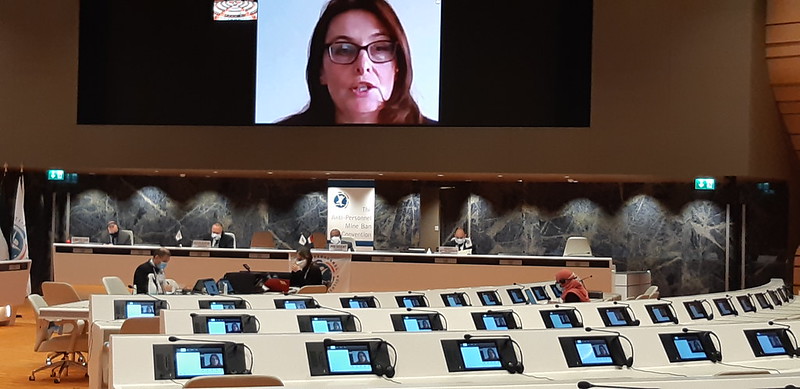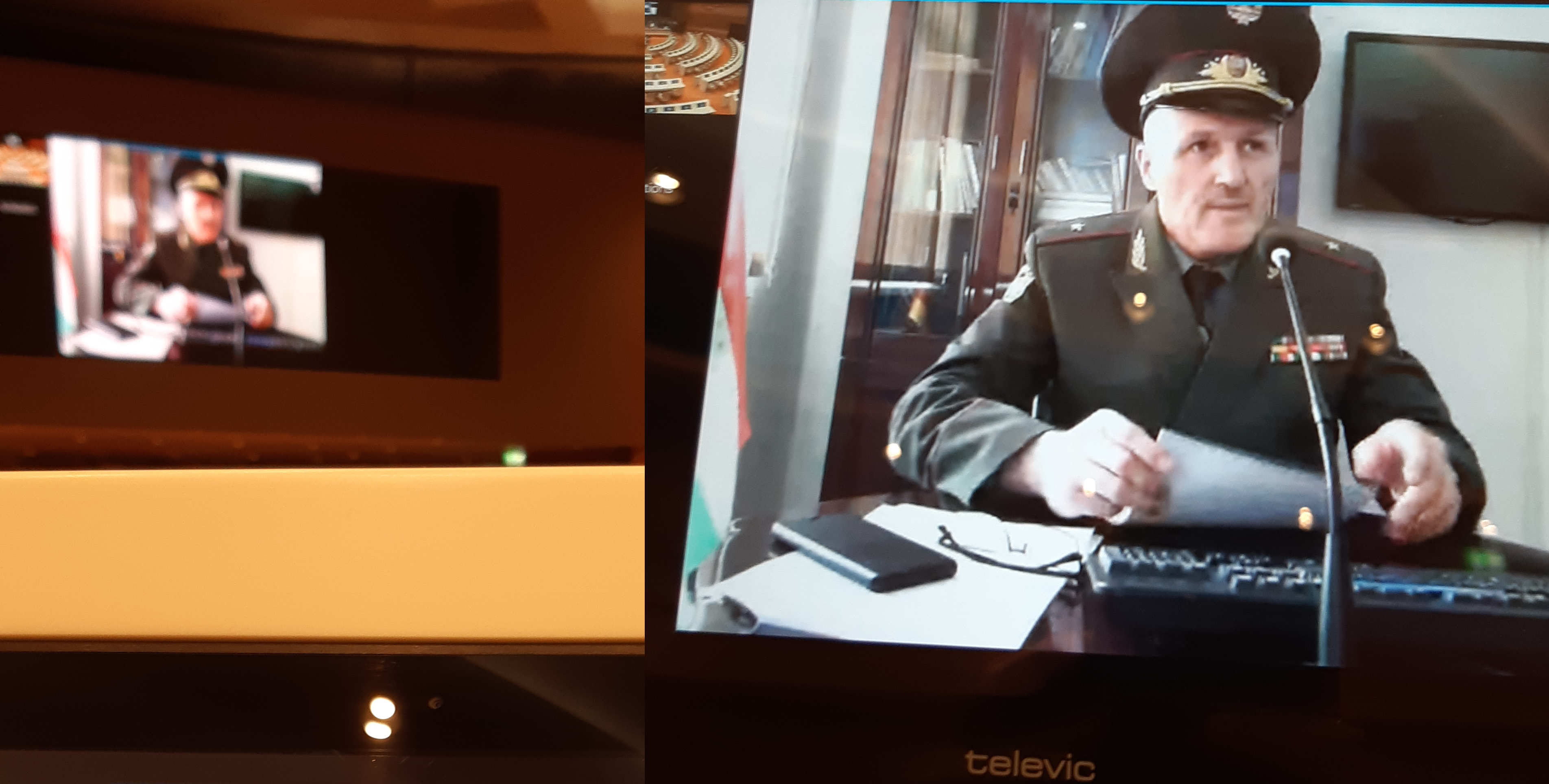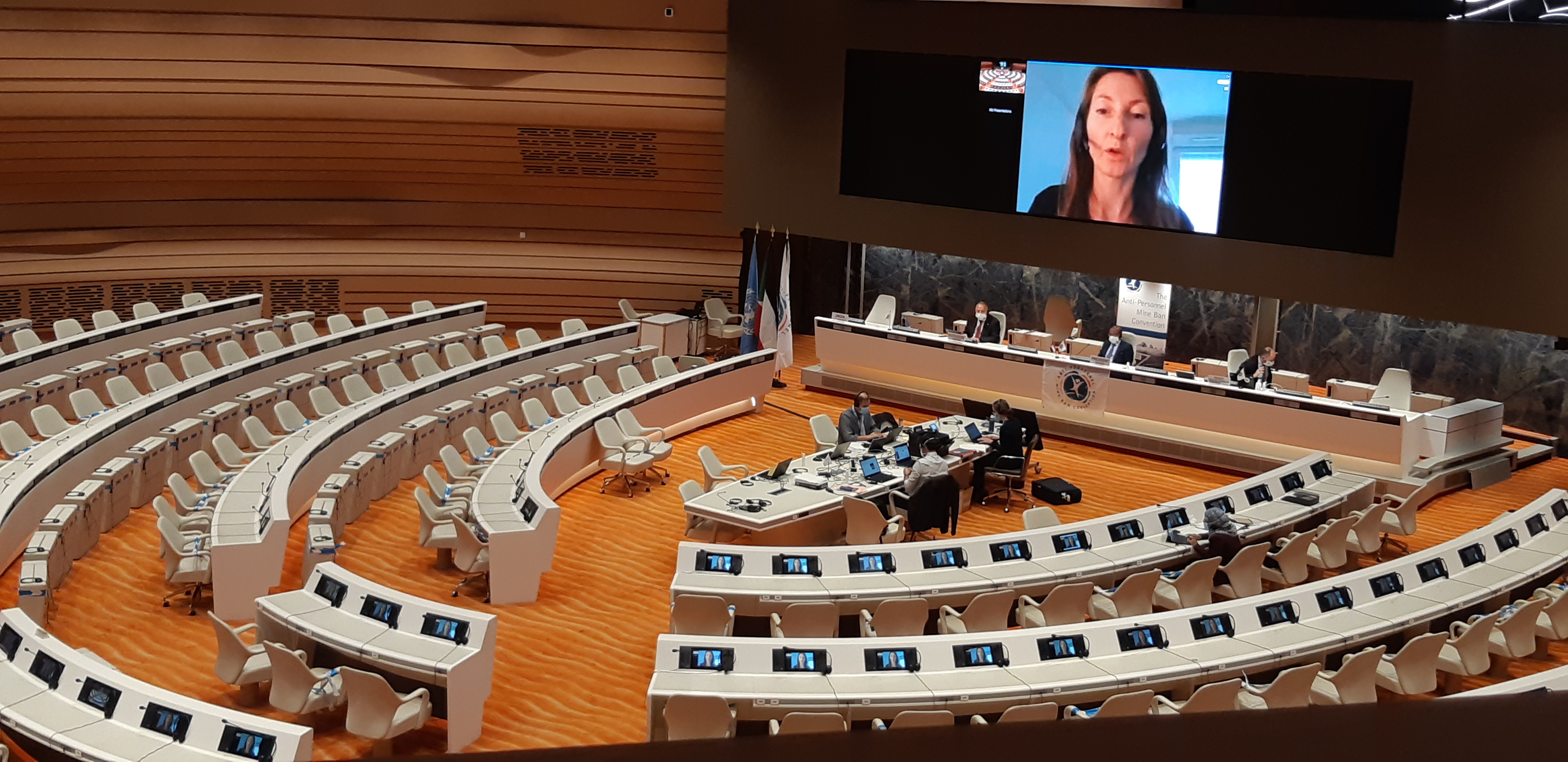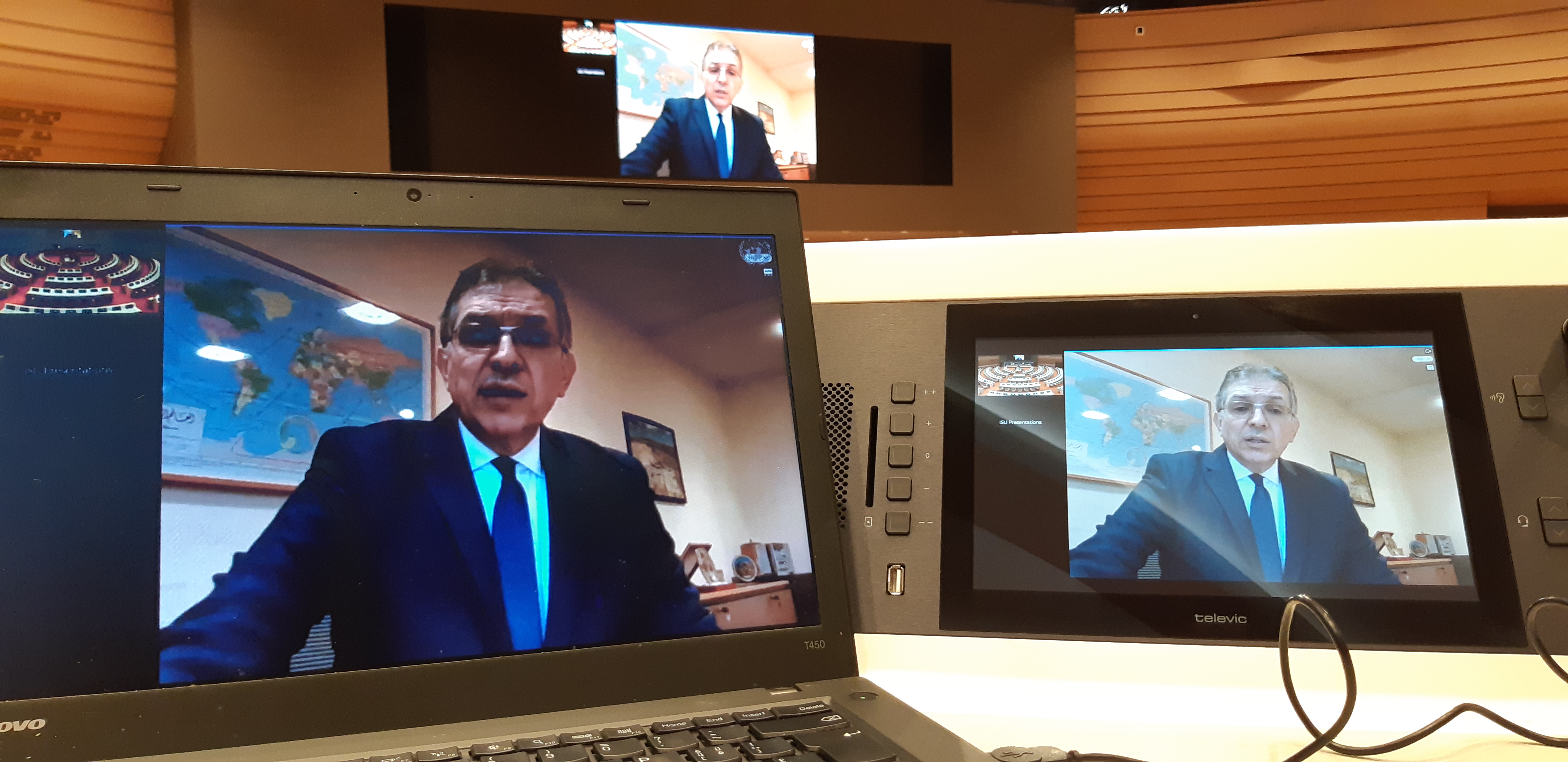|
20.11.2020
Download the press round up in pdf | Find photos and videos hereView the press conference hereGeneva – Sudan has concluded a week of work leading the annual meeting of the States Parties to the Mine Ban Convention with with nearly 500 registered participants from 99 States (88 Parties, 11 not party) and more than a dozen international and non-governmental organisations, attending virtually from around the globe. Netherlands was elected as new Convention President. Minister for Foreign Trade and Development Cooperation of the Netherlands spoke on the priorities for the Dutch Presidency, as did the 19MSP President. China, India, Israel, Lao People’s Democratic Republic, Lebanon, Libya, Morocco, Myanmar, Republic of Korea, Syrian Arab Republic, and United States of America participated as Observers. This is the first formal meeting for the Republic of Korea, and the first for Israel in 16 years.
The following countries requested that their mine clearance deadlines set for 2021 be extended due to a number of issues ranging from lack of funding, to sheer extent or lack of knowledge of contamination. The requests were granted as follows, Bosnia and Herzegovina until 1 March 2027; Colombia until 31 December 2025, Democratic Republic of the Congo until 1 July 2022; Niger until 31 December 2024; Senegal until 1 March 2026; South Sudan until 9 July 2026; and Ukraine 1 December 2023. The Meeting regretted that Eritrea had not submitted a request ahead of its impending 31 December 2020 deadline which makes it non-compliant. Mauritania which had declared itself mine free in 2018 and has since discovered previously unknown mined areas, and Nigeria which declared itself mine-free nearly a decade ago is experiencing new contamination of anti-personnel mines of an improvised nature, are to gather and assess data on the previously unknown/new contamination and submit a new more detailed request by 31 March. Unofficial summary provided for press purposes only; it may not include all States that presented statements – official report can be found here.Afghanistan said it is in “the process of creating a 10-year national disability strategy, which is going to be officially launched on 3 December 2020” (the International Day for Persons with Disabilities). Algeria indicated that a July 2020 report counted over 7,000 mine victims which are currently registered and have the right to receive assistance through a national programme. Algeria declared completion in 2017. Angola said that in spite of the “progress so far achieved; the challenge still remains” with “85 million square metres that still has to be cleared.” It says it has pledged “60 million USD over five years to the clearance of an area of special natural significance with a view to creating a sustainable, community-focused ecotourism centre and begin the process of diversifying the country’s economy”. Australia said it provides support for “risk education and clearance activities in Afghanistan, Cambodia, Iraq, Myanmar, Sri Lanka and Syria; and victim assistance in Myanmar and Syria”.
Belgium says it is committed to “a mine free word, but also to a world free of new or unassisted mine victims. We are very concerned with the increase in mine casualties over the past years”, Belgium said. Chile thanked the men and women who worked as deminers in its mine-free quest and assessed the price tag for clearance and risk education for the past 18 years to 75 million USD which it “considered worth it”. Chile also said it will continue its obligation to assist the victims through its 2017 Victims Law. Colombia said it registered 140 new casualties to date bringing the number of mine victims to over 11,000. Cambodia one of the most mine-affected countries in the world said it would need “a budget of 377 million US dollars to achieve a mine-free 2025 goal and minimize the threat of other explosive remnants of war. This includes a need to secure at least 165 million dollars from 2020 to 2025 to remove all known anti-personnel mines from Cambodia”. Canada which was also Chair of the Committee on Article 5 implementation said it “is important that States Parties report on improvised anti-personnel mines, even if they are party to other legal instruments that cover such devices.” Chad said that in spite of all the difficulties it faced, in 2019 it was making progress in mine clearance and risk education. With the current Covid situation mine clearance stopped in April and only restarted in September. Croatia said that with support of Switzerland it had carried out a survey of mine survivors and their families and was planning on publishing a “brochure with rights and opportunities available to mine victims in the Republic of Croatia and a guide on how to use them.” Croatia also said, “it is on track to achieve the planned mine action goals, in spite of a two-month standstill of demining activities caused by the pandemic and a reduction of budget funds earmarked for demining”. Ecuador and Peru said mine clearance operations had been delayed until 2021 but have agreed in common accord to carry out mine risk education in border areas. The Organization of American States (OAS) hopes to be able to bring awareness to the needs of these two countries which could finish their mine clearance operations with some support of the international community. El Salvador which cleared its territory of landmines more than two decades ago and recorded over 4,000 mine victims, informed that these persons continue to receive regular support under a national law that includes all persons injured during its internal conflict. Ethiopia said that in spite of clearance efforts in 2020, lack of funding, insecurity and the remote areas in which the mine fields are located in are hampering efforts. France which provides mine action support in nearly 15 countries, recalled “the importance of not concentrating all resources on the most affected countries and forgetting […] countries with old contamination”, and called for “coalitions of states to help Chad, Niger, the Democratic Republic of Congo, Senegal, Mauritania or Sri Lanka which could quickly be free of mines.” Germany said in “2020, Germany will spend more than 47 million EUR on humanitarian mine action in 13 countries and regions”, focusing “on the full spectrum of mine action: survey and clearance of landmines and explosive remnants of war; mine risk education; mine victim assistance; and advocacy.” Greece said that national delays paired with Covid-19 “restriction of movement even between cities of the same country is also a reality that we cannot ignore, and, of course, had an impact on the lack of progress in the stockpile destruction over the last year”. Greece has missed its stockpiled destruction deadline. Iraq says a survey in five directorates affected by mines and other remnants of war counted nearly 34,000 victims; due to the large number of war victims it has requested assistance to effectively provide rehabilitation and prosthetic to those who need it. As per mine clearance, security continues to be a challenge but it says it is making progress. Ireland said it is “currently in a 3 year mine-action programme worth €5.5million with long standing partner HALO Trust covering demining programmes in Afghanistan, Colombia, Somalia, South Sudan and Zimbabwe.” Italy said it was “deeply concerned by the increasing number of casualties” and expressed its “firm condemnation of the use of anti-personnel mines by any actor and urge all States and non-State actors to refrain from it.” In 2019, it allocated more than 4 million to humanitarian mine action programmes including assistance to victims in Afghanistan, Iraq and Syria. Japan said it is “deeply concerned that landmine casualties continue to be recorded despite our strenuous efforts”. Japan said it would promote the Convention and its norms, especially “as the number of States Parties in the Asia-Pacific region remains relatively limited,” for which it “will seize various occasions, such as bilateral consultations or regional meetings, to continue to encourage states non-parties of this region to join the Convention.” Mexico says it “regrets that the United States has reversed its previous policy” and encouraged it to again take steps to revert such policy. “We condemn the use in Libya and Myanmar, as well as by other non-state armed groups on various continents. It is also extremely worrying that for the fifth consecutive year there have been high numbers of victims”. Netherlands in a written statement said it sees as hopeful the progress made by countries becoming mine free, and advancements in victim assistance, and as worrying to “see some countries that were mine free being contaminated again by mines of an improvised nature, that the clearance of contaminated areas in some countries seems to have stalled and see a State not party deploying anti-personnel mines in a current conflict.” It strongly condemned AP mine “use anywhere, anytime and by any actor.” New Zealand urged all states-not party to join the Convention to make this global norm truly universal even though those who have still not joined “are most strongly opposed to it including some of the world’s current and past producers of landmines”. New Zealand condemned “in the strongest terms any use of anti-personnel mines, in any form, by anyone, anywhere”, and said the use of improvised mines “is of grave concern” and that it deeply "regrets the continued use of anti-personnel mines in Myanmar”. Philippines said it “supports the strengthening of a normative framework against the use of mines by armed non-state actors, including terrorist groups”. Serbia says, “it is facing with a problem of newly discovered mine suspected areas in the Bujanovac Municipality.” It is carrying risk education taking into consideration the local population, as “wording on the signs has been written in Serbian and Albanian.” South Sudan said it has “continue to record increases on the number of mine and other explosive remnants of war victims” which now amount to over 3,500 and has developed a national disability action plan which it hopes to use as a resource mobilisation tool. Spain worked with the Organization of American States, to support training for mine clearance officers of nine Latin American countries. Sudan which has recorded over 2,000 casualties says poor funding and security concerns in some parts of South Kordofan and Blue Nile has difficulted the provision of assistance to victims in those areas. It also is seeing “mine action and clearance as key in its road to peace” and has invited “mine clearance organisations to come to Sudan to assist in humanitarian clearance”. Sri Lanka said the pandemic and lack of funding has delayed mine clearance and risk education. Still as of “November 2020, it is reported that 813,222 anti-personnel mines have been destroyed.” Sweden said it supports the “Swedish Committee for Afghanistan’s orthopaedic and physiotherapy services in Afghanistan for several years. Our main approach is to provide multi-year funding and currently Sweden is funding mine action in 12 states around the world including Colombia, Libya, Ukraine, Iraq, Afghanistan and Syria.” Switzerland said the “high number of casualties of anti-personnel mines of an improvised nature remains a source of concern”, while emphasizing that “these devices fall under the definition of anti-personnel landmines and are therefore prohibited under the Convention. We consequently call upon all State Parties affected by anti-personnel mines of an improvised nature to include them in their demining plans and destroy them as required by Article 5”. Tajikistan which has declared responsibility for significant number of mine victims says it “lacks funds to implement Victim Assistance projects, technical support for the provision of emergency and ongoing medical care and trained specialists” among other challenges. Thailand says Covid-19 restrictions has hampered mine risk education activities, but is relying on “Village Health Volunteers” to reach at-risk communities. As per mine clearance, it indicated it had carried out one of its most “challenging” tasks, in areas “surrounded by high cliffs, and no road access” which meant airlifting “both personnel and equipment”. It says it is on target to meet its 2023 deadline. Turkey said “mine clearance operations and mine action activities have steadily intensified” since 2015 when the Mine Action Centre was created but the task ahead could require additional time beyond its deadline to clear. It also said that in 2019, there were 100 new mine or other explosive device victims, bringing the total number to “4,515 mine or IED victims”. Ukraine which in the past years has seen an increasing number of mine victims, said it has started a national database registration of these persons and is “actively engaged in the socio-economic reintegration and employment of mine victims which receive compensation”. United Kingdom says it continues to support mine clearance and risk education benefitting 2.2 million people, and supporting capacity building of national, regional and local authorities and is considering extending its current funding to March 2021 “to continue work in 14 heavily mine-affected countries”. Uruguay expressed concern over growing use of anti-personnel mines by non-state actors. Venezuela lamented new use of AP mines of an improvised nature and the United States’ new landmine policy and called on the US to revert it. Yemen said the war has resulted in a “humanitarian catastrophe” with larger contamination areas than before for which it will require international assistance to clear. Yemen says it also faces many challenges for the provision of assistance to mine victims including new casualties, scarcity of resources, and the remote areas where the victims live. Zimbabwe said its “chances of completion before 2025 are high” but that was “unable to carry resource mobilisation due to the pandemic”; and that “while there has been behaviour change by landmine-affected communities, some few incidents of children being killed or maimed by explosive remnants in non-landmine contaminated regions have been witnessed, and a more comprehensive risk education covering the whole country will be needed”. The European Union, called “all States not Parties, in particular major possessors of anti-personnel mines, to follow a self-declared policy of non-use, which will contribute to the universalization of the Ottawa Convention. In that regard, the EU calls upon the United States to re-examine its decision to re-authorize the use of anti-personnel mines by US military forces outside of the Korean Peninsula. The EU counts on the US to remain a partner and a top provider of mine action assistance.” The United States is the world’s top mine action donor, followed by the European Union. States not party
China said it continues to provide mine clearance support and deplored the United States’ reverse on landmine policy outside of the Korea Peninsula. It says it continues its moratorium on landmine as per Protocol II, and support to mine clearance in Cambodia and Lao PDR and ERW removal in Lebanon. India said it is “committed towards reducing the dependence on anti-personnel mines. We believe that the availability of militarily effective alternative technologies that can perform the defensive function of anti-personnel landmines in a cost-effective manner, will facilitate the goal of their complete elimination.” Korea (Republic of) attended for the first time a formal meeting of the Convention as Observer and indicated that while it cannot yet join, it is carrying efforts “at the domestic and international level to mitigate the suffering caused by anti-personnel mines”, and “enacted the ‘Special Act on the Support for Mine Victims’”. Korea reaffirmed that it “will continue the dialogue and explore further opportunities for cooperation.” Libya said it is suffering from new mine contamination, and expressed its desire to join the Convention for which it has formed a “working group to assess and exam the necessary steps” needed to do so. Libya says it views mine clearance “as an important step” towards its development goals. Morocco said it abides by all Convention principles including filing yearly transparency reports to the Convention but abstained from saying it would join. Myanmar said it “has formed the Mine Action Working Group on 22 May 2020 in order to craft the National Mine Action Strategy. It is indeed the first step towards formulating a National Strategy and Plan of Action for mine clearance”, and called for “continued support from the international community and relevant international organisations as it will help us to further promote awareness on mine risk education, and facilitate physical rehabilitation, vocational training, and socio economic reintegration in the country.” Syria said it is carrying clearance and risk education with support of the UN Mine Action Service, and provides assistance to victims with support of international and non-governmental organisations and called on the international community to provide support towards these activities. Editorial note: The Anti-Personnel Mine Ban Convention also known as the Ottawa Convention was adopted in 1997 and entered into force on 1 March 1999. There are 164 States Parties representing more than 80% of the countries in the world; together these States have destroyed almost 53 million stockpiled anti-personnel mines and released millions of square meters of land that were once contaminated. The Convention was the first multilateral treaty to take into consideration the rights of a weapon’s victims. The Eighteenth Meeting of the States Parties in Geneva took place from 16-20 November in virtual format due to Covid-19 restrictions in place in Geneva. |



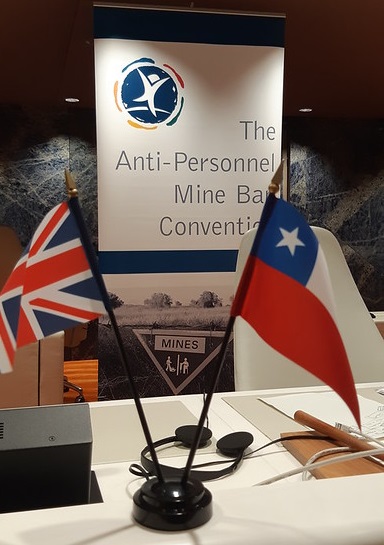 Chile and the United Kingdom announced having cleared all their known mine fields bringing now to
Chile and the United Kingdom announced having cleared all their known mine fields bringing now to 